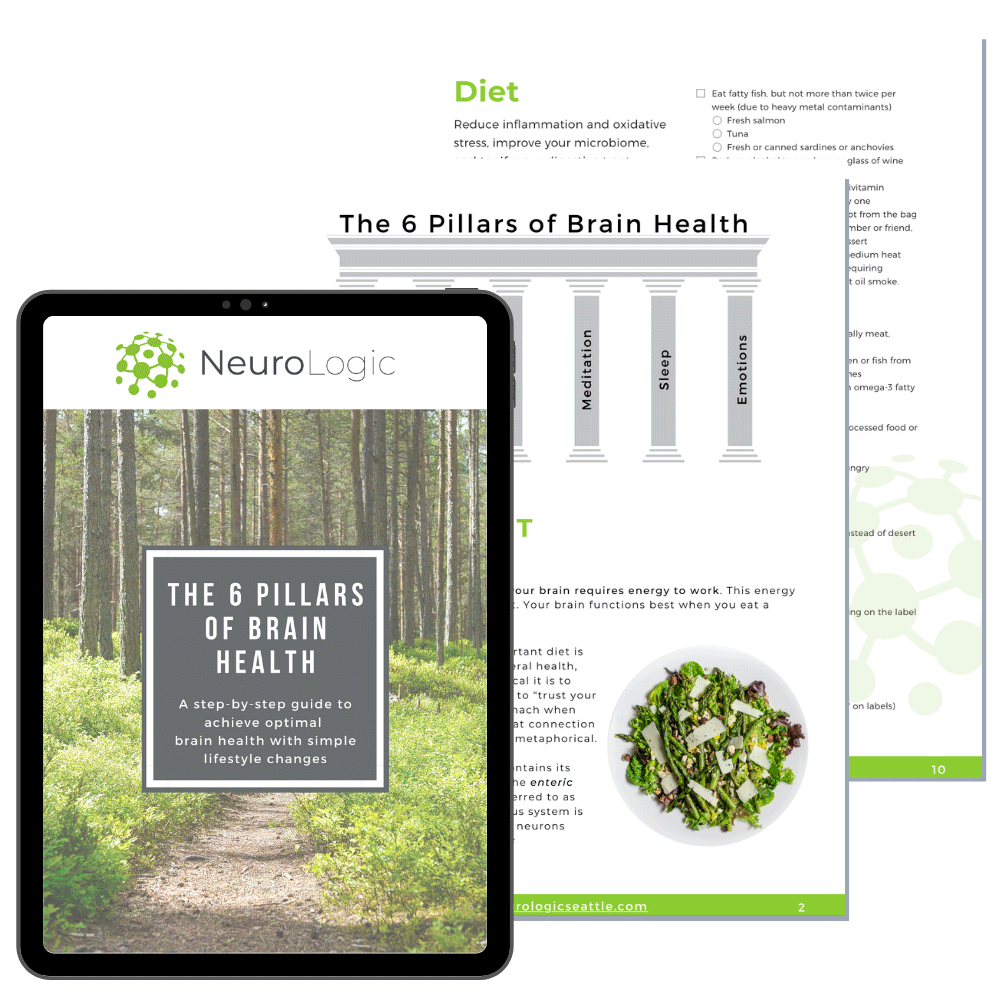Seattle boasts some of the best natural beauty in the country. Lakes, coastline, mountains, evergreen forests – we’ve got it all.
There’s no doubt our scenery is breathtaking to see, but why do we crave nature so much? It turns out our draw towards nature is biological and it runs deep.
While modern life has changed dramatically from our prehistoric past, our brains have essentially remained the same. Your brain craves connection to nature, and finding time to satisfy that craving has a whole host of surprising benefits.
In this article, we’ll take a deep dive into the amazing powers of Mother Nature and why time in nature is absolutely essential for optimal brain health.
What Happened to Our Connection to Nature?
Nature makes up every part of the world around us that isn’t human-made – specifically plants, animals, and landscapes.
Humanity has always been intimately tied to nature. We lived on the land, gathered our own food, and timed our day according to the sunrise and sunset.
Unfortunately, the last 100 years have driven us overwhelmingly indoors. We drive to work instead of walking, and we spend much of our days and nights indoors on electronics. Essentially, our connection to nature has all but disappeared, and our brains have suffered as a result.
Today more than half of the world’s population lives in urban areas. That’s not too surprising, but what is surprising are these little-known facts:
- City dwellers have a 40% higher risk of mood disorders, compared to people in rural areas.
- City dwellers have a 20% higher risk of anxiety disorders, compared to people in rural areas.1
The good news? Getting reconnected to nature is pretty simple. You’ll not only gain time in the beauty of the outdoors, you’ll get these 5 brain benefits as well.
1. Nature Improves Your Mood
Anyone who’s sat next to a mountain stream or walked on a beach knows that nature has a calming effect on our mood – but studies show that nature can actually decrease depression2 and increase feelings of happiness.3
Nature also decreases rumination – a key symptom linked to depression. Rumination is when you think the same negative or dark thoughts over and over. It turns out that a 90-minute walk in nature lowers activity in the region of your brain linked to rumination.4
Being outside in natural light is also the best way to combat seasonal affective disorder (SAD), a type of depression that affects people at specific times of the year.
When choosing between hitting the trail or hitting the gym, the trail has clear benefits. Studies show that exercising in natural surroundings – rather than indoors – results in:
- More energy
- More engagement
- Greater sense of vitality
- Decrease in tension and anger
- Less confusion.5
As fall comes and temperatures drop, we have a natural inclination to want to stay indoors more and venture out less.
Fighting that urge and getting out in nature can improve your mood – especially during the gray days of fall and winter.
2. Nature Improves Your Memory and Cognition
Do you remember the last time you spent quality time in nature? You probably felt more clear-headed as you inhaled the cool, fresh air.
We could all use a little more brain power these days. It’s hard to believe that being in nature could actually improve your memory, but it’s true.
One study found that people who took a walk in nature scored better on a memory test than people who walked down city streets.6
Another study found that spending more time outside and less time on our electronic devices actually improved problem-solving skills and creative abilities.7
3. Nature Improves Your Attention and Focus
Nature improves higher-order executive functions like focus and attention.8
Scientists believe nature works by modestly grabbing your attention through gentle stimuli like trees and wind. This gentle approach gives your attention abilities the chance to recover and strengthen.
Urban settings, on the other hand, grab your attention suddenly and require constant focused attention (say, to avoid being hit by a car). This makes urban settings far less restorative because there’s no chance for your attention to recover or strengthen.
Evidence shows that being in natural settings is related to:
- Better performance
- Improved concentration
- Reduced chance of developing ADD9
If you or your child have difficulties with attention and focus, a daily dose of nature is a safe, inexpensive way to expand your treatment toolkit.
4. Nature Improves Sensory Awareness and Gives Your Brain Time To Recover
Your senses give you information about the world around you. They’re how you know someone is sad or that a car is coming down the street.
When you spend all your time in manmade spaces, you lose a bit of your sensory awareness. The steady stream of noise from cars, people chattering, and crowds of people in your visual field can overwhelm your senses.
Think of it like a bucket, and each piece of sensory input is a drop in that bucket. Before long, your bucket is overflowing, and you become either intolerant or numb to more sensory input.
Spending time in nature empties that bucket and gives you a fresh start. It’s like a reset button, allowing your senses to decompress and take a break.10
When you spend time in nature, you’re more mindful of what you see, what you smell, what you hear, and what you feel. You smell the rain in the distance and the scent of the pines. You feel the soft breeze and the warm sun on your skin. You hear birds singing and leaves rustling. You see the sun glistening on the Sound as the waves lap against the rocks.
Who doesn’t want that?
5. Nature Reduces Stress and Anxiety
Being in nature reduces stress by lowering the stress hormone cortisol.11
After a long, stressful week, would you rather spend your Saturday at a crowded shopping mall or relaxing on a beach? There’s no doubt I would pick the beach every time.
Being in nature just feels relaxing, but science actually proves the point. Nature seems to work through a mechanism called the “Relaxation Response.” This response is controlled by the parasympathetic nervous system – the part of your nervous system that triggers you to “rest and digest”.
Spending time in nature engages your parasympathetic nervous system, which then reduces your cortisol levels. At the same time, it calms the “fight or flight” response that’s so often associated with chronic stress.
The stress-reducing benefits of nature can even be enjoyed with others. Going on group nature walks lowers perceived stress during stressful life events. So even though you may be going through a rough patch, group nature walks can help you feel like it’s less stressful than it would be otherwise.12
Try These Tips to Spend More Time In Nature:
You probably have your own favorite spots in nature to enjoy. Here are a few more ideas to add to your list:
- Pack a picnic and head to a neighborhood park for dinner.
- Find a good book and read outside.
- Meet a friend for coffee at an outdoor cafe, or go by yourself.
- Grab your bike and head to a bike trail.
- Kayak or paddle board on the lake.
- Take a walk on the beach.
- Stroll through one of the many gardens, preserves, or parks in the area.
- Walk around your neighborhood.
- Take up an outdoor hobby like bird watching, hiking, or gardening.
There are so many opportunities to connect with nature. Make time in nature a part of your daily routine – your brain will thank you.
Need More Brain Help?
If you’re looking for help with brain health issues like anxiety, depression, ADHD, trauma, or headaches, schedule a free Discovery Call to learn more about our services.
NeuroLogic has helped hundreds of people in Seattle overcome disabling symptoms to live a freer, fuller life. Reach out today.
References:
- https://news.stanford.edu/2015/06/30/hiking-mental-health-063015/
- https://pubmed.ncbi.nlm.nih.gov/24662966/
- https://pubmed.ncbi.nlm.nih.gov/21828351/
- Bratman GN, Hamilton JP, Hahn KS, et al. Nature experience reduces rumination and subgenual prefrontal cortex activation. Proceedings of the National Academy of Sciences of the United States of America. 2015(112);28:8567-8572. doi: 10.1073/pnas.1510459112.
- https://www.sciencedaily.com/releases/2011/02/110204130607.htm
- https://journals.sagepub.com/doi/10.1111/j.1467-9280.2008.02225.x
- Atchley RA, Strayer DL, Atchley P. Creativity in the Wild: Improving Creative Reasoning through Immersion in Natural Settings. PLoS ONE. 2012;7(12):e51474. doi:10.1371/journal.pone.005147


